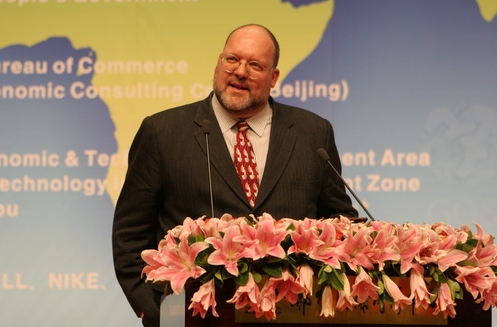
Good morning, Your Excellency Mr. Dominique de Villepin, Former Frime Minister of France, honorable General Christian Quesnot, respectable Mr. Guo Gengmao, Acting Governor of Henan Province, Mr. Wang Wenchao, Secretary of Zhengzhou Municipal Committee of the CPC, Mr. Zhao Jiancai, Mayor of Zhengzhou, and dear leaders and participating representatives.
The global financial crisis will certainly come to an end one day, maybe in a year, or a couple of years. But the global knowledge capital will increase anyway.
The future belongs to those who take the initiative to find opportunities to develop their business. That means we should seek opportunities in the midst of the crisis rather than wait until the end of the crisis. During the crisis, we could still find some people who make money and who take advantage of this opportunity to serve our community. These people believe that one day the crisis will be over.
I am Arthur Coren. I would like to take this opportunity to tell something about the education outsourcing in which you might be interested. I am from Business School of the Kwantlen Polytechnic University. Located in Kwantlen, our University has four campuses in the Greater Vancouver Regional District with a total of 17,000 domestic students, and 840 international students and we offer bachelor and master degrees. Any one who wants to further education is welcome to our University.
Next I would like to talk about the outsourcing education. Outsourcing has typically looked at:
Firstly, Business Process Outsourcing (BPO). BPO includes accounts payable, fleet servicing and “back office” functions. Besides, there is also the Knowledge Process Outsourcing (KPO) which includes industrial design, patent research and clinical trials. Now a new field of outsourcing has emerged —the outsourcing education.
Secondly, Education Process Outsourcing (EPO). Why is EPO so useful? Because we have a model in which we scholars go all over the world to make speeches and thus attract students to teach them. This can be called the process of education outsourcing. It can be seen that the process of education outsourcing mainly focuses on student learning, research-led teaching, academic innovation, basic research, applied research, dissemination of knowledge and social innovation, which are the basic purposes of the educational institutions and also their core functions.
In fact there are still many areas to be outsouced for the educational institutions. Due to technological and fiscal considerations, in the modern school or university there are few things that cannot be outsourced. They have come to realize these opportunities. Why would these educational institutions outsource some of their businesses? There are many reasons and the most basic one is that they want to save costs. They want to save costs through outsourcing and at the same time enhance customer service, add additional capabilities and allow company to concentrate on core functions.
Of course, people are worried about education outsourcing. For example, they are worried about loss of control, political issues, service quality, academic rigor, union issues, loss of jobs, loss of capability and so on.
Then let us take a look at nationalism and culture. Could a country, region, or municipality ever truly outsource its education system? For example, Would the Qingdao No. 1 High School let the Los Angeles Unified School District operate its school and develop and deliver its curriculum? This is almost impossible. What would the people of Qingdao think? A lot of outsourcing activities are carried out secretly. Some organizations don’t want to reveal the fact that they send work to other companies or other countries.
Why education outsourcing fails? There are a number of reasons:
1. Communications;
2. Cultural/strategic misalignment;
3. Failure to perform;
4. Management abdication / lack of oversight;
5. The process was “broken” before it was outsourced.
6. Negative perceptions / “bad optics”.
The demand for education outsourcing service is huge and it requires cooperation. In order to make education outsourcing a success, we should pay attention to the following key factors:
1) Make it a true partnership;
2) Know your partner’s culture and goals;
3) Look at the “big picture”;
4) Do a risk assessment;
5) Stay flexible.
Finally, to sum up, I’d like to quote one sentence from Robert Maynard Hutchins, Former President of the University of Chicago: It is a good principle of educational administration that a college or university should do nothing that any other agency can do as well. We can see the importance of education outsourcing as an industry from this sentence. We can also see that this is a good principle because a college or university has a vast and complicated job even if it does only what it can do.
I’d like to convey my thanks to Asia-Pacific CEO Association, International Outsourcing Center, Henan Provincial Government and Zhengzhou Municipal Government for your invitation. I also hope you will pay a visit to my University.
|